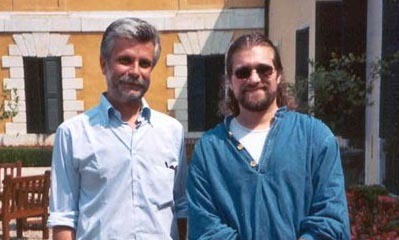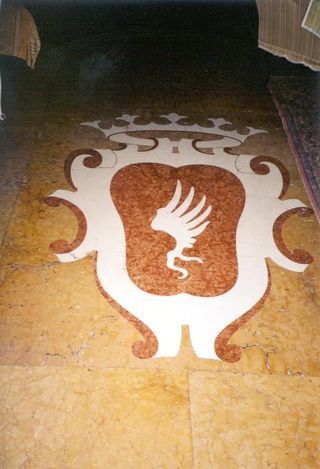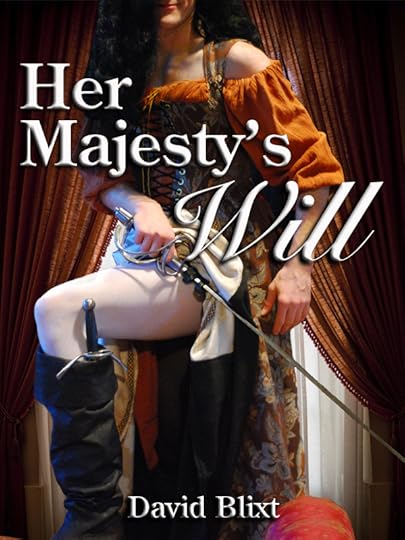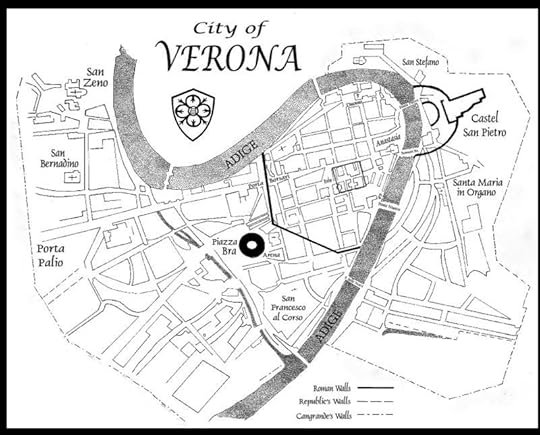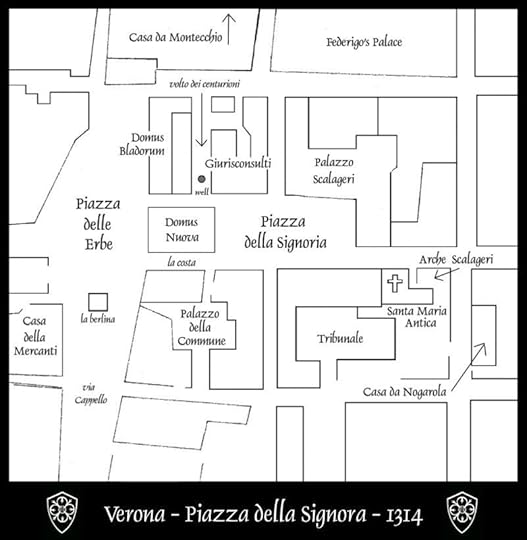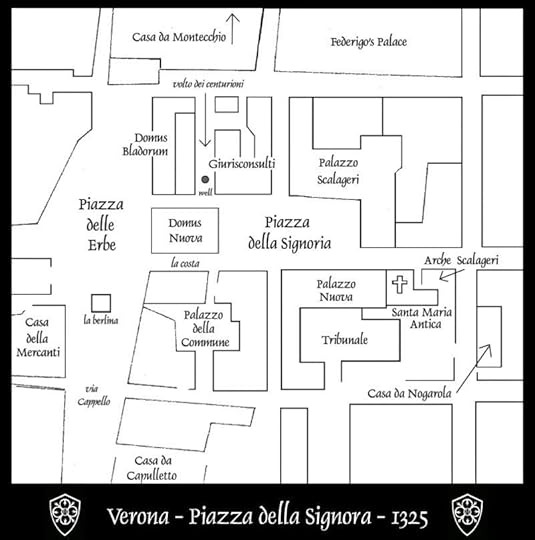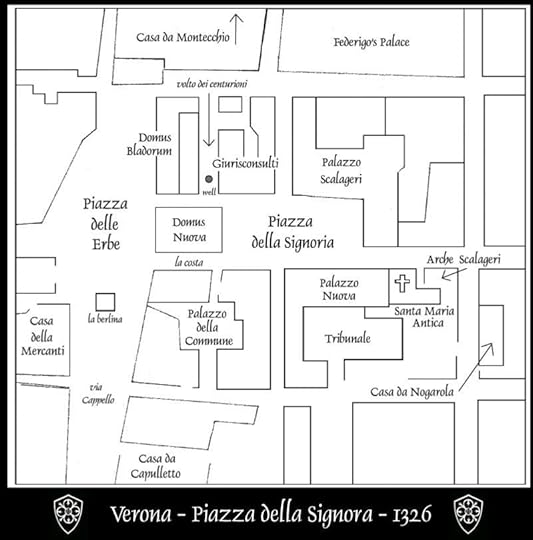David Blixt's Blog, page 20
June 14, 2012
Guest Post - Jan Blixt and Coffee with the Count
In THE MASTER OF VERONA, the title ‘Count’ is reserved for my villain, the historical Count of San Bonifacio. But if I were to mention the Count to my wife, she would respond with a smile and a joke about pouring coffee.
She tells this story so much better than I do. So, without further ado, Jan Blixt telling the story of ‘Coffee With The Count.’
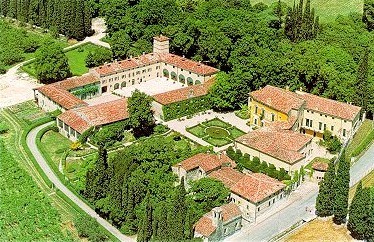
David and I got married in 2002. Our honeymoon also served as a research trip for him. Of the three months we spent touring Europe, starting in Greece and ending in London, fully a month was spent in Italy. Of that month, a week was spent in Verona. Thanks to the advice of a friend, photo-journalist David Turnley, he’d been in contact with Antonella Leonardo, an assistant minister of culture. She arranged every meeting we had in Verona. It was June, and Italy was experiencing a major heat wave, so there were a lot of dinners.
The first time we met her, she gave us a list of places to go, people to talk to, and, in passing, handed David a card saying, “And, of course, you'd like to talk to the Count of Serego-Alighieri. He still lives on the estate purchased by Dante's son.”
Well, yes... of course we would... ummm... wow... the Count has a card. Ok.
So we sat on the bed in our hotel room debating just what one should say to a Count when one calls to set up a chat. Finally deciding our natural paralysis was a bit ridiculous, David, in a burst of confidence and devil-may-care energy, called the number we had been given... and reached the Count's teenaged daughter. "Pronto."
David said something like, "I'm looking for the, uh, Count?"
"My father isn't here. Leave your name and he'll ring you back."
Minutes later the phone trilled, and I leapt for it. "Hello?"
"Hello. This is Piere-Alvins, the Count Serego-Alighieri."
"Hi! Um, my name is David Blixt. I'm writing a book about Shakespeare and Dante, and one of the main characters is Dante's son, Pietro. I was, ah, wondering if I could come out and – speak to you."
"How long are you in Verona?"
"Until Saturday."
"Come up tomorrow morning. 10 o'clock. Yes?"
"Yes! We'll be there!"
“Ring the bell.”
That night, David and I had a wonderful dinner with a couple of college professors, true academics and Marxists to the core. The meal was lovely – other than the argument we had when we mentioned our next day's excursion: “Italy is a democracy! There are no Counts anymore!”
Well, okay then... But we were still set to meet the direct descendant of Dante Alighieri at the home and vineyard Pietro Alighieri purchased in 1353! Call us starstruck, but that was pretty cool in our minds. We whispered to each other in the cab on the way home from dinner “And he is SO a Count.”
The next morning we took a cab from our hotel to the address we had been given, many miles outside of the city, down winding country roads. The cabbie stopped the car next to a rather nondescript 15 foot high stone wall. In garbled Itanglish, we asked “Is this it?” He nodded and pointed at the wall. 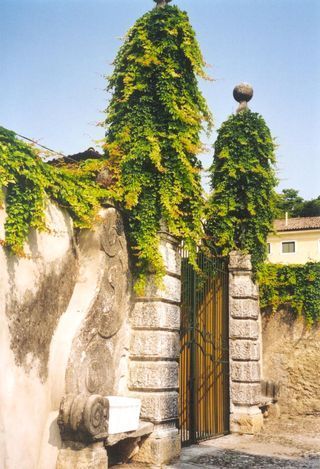
As the cab drove away, David noticed that there were some buzzer buttons placed high on the wall – the kind you find at the front door of many Chicago 3-flats, little white buttons with little white nametags made on a labeling machine next to them. They said things like ‘Vineyard Business Office’ and ‘First Floor Office’ – in Italian, of course. One said ‘Count Serego-Alighieri.’ Giggling like five-year-olds, we pressed that button. After a moment, a low voice came over a small speaker, "Si?"
Immediately sobering, David said, "Hello. My name is David Blixt and I have an appointment to meet with the Count." After a pause, "Si, yes, turn the corner and go in the Vineyard office."
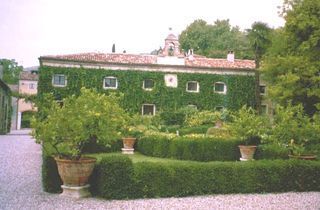 About 20 feet from the little buttons, the wall made a turn. We walked to that point and saw that where the wall seemed to end was a door into a large, rustic, wood paneled and beamed room full of racks and barrels – the walls covered with bottles of wine and vinegar. There was a counter on one wall with two young women wrapping bottles for shipment, and a desk near a door on the far side of the room with a young man who appeared to be doing accounts. The workers in the room barely glanced up. David and I stood in the dim room nervously waiting – for what we weren't sure.
About 20 feet from the little buttons, the wall made a turn. We walked to that point and saw that where the wall seemed to end was a door into a large, rustic, wood paneled and beamed room full of racks and barrels – the walls covered with bottles of wine and vinegar. There was a counter on one wall with two young women wrapping bottles for shipment, and a desk near a door on the far side of the room with a young man who appeared to be doing accounts. The workers in the room barely glanced up. David and I stood in the dim room nervously waiting – for what we weren't sure.
A moment or two later, the far door opened and a man entered. He was of medium height, slight of weight, and had straight brown hair, greying at the temples, in an expensive cut. He was wearing a linen button-down white shirt with the sleeves rolled to the elbows and open at the neck and grey linen trousers. He looked at the two of us and approached with a hand outstretched. “Hello, I am Piere-Alvins Serego-Alighieri and you must be David and Mrs. Blixt.” We nodded and smiled as David shook hands with him and he nodded in greeting to me. “Why don't we go into the house.” And he turned and walked towards the door from which he came.
The Count lead us into a large paved in stones courtyard framed by the vineyard building we had just left, a large square barn-like building, a long, two-storied stone building, and the house.
The house! A lovely Italian stone house that looked both fresh and inviting and also as if it had been there forever, carved out of the countryside. It had large double doors in the center of the first floorthat led us into a two-storied entryway. The marble floor was polished to an almost mirror-like sheen, the center of the floor containing an inlaid heraldic crest. David and I skirted the crest, trying to study it and the rest of the room surreptitiously while following the Count. He noticed our appraisal of the floor and said, “That was updated in the 1470s when the Serego family married the Alighieri. It was originally just the Alighieri symbol – now it is much more.”
David told him that the main character of his book was Pietro Alighieri and that we were very interested in the home that he had built – and were fascinated to discover his descendant still lived there.
The Count smiled briefly. “Then you will appreciate this.” He opened a large cabinet against a wall in the entryway and pulled out a poster-sized piece of parchment. He held it up for us to see, and as we tried to decipher the Italian of the document he said, “The original deed to the property.” Seriously. He just happened to have a document from the 14th century in a cabinet in his entryway. “Let me show you around.”
Piere-Alvins Serego-Alighieri is an elegant man. I can't think of any other word to describe him. He is soft spoken, his low voice easy to hear and relaxed with a lovely Italian accent to his fluent English. He uses his hands occasionally as he speaks – not in the stereotypical Mediterranean style, but simply, casually, with fluid motions from the wrists. He’s the kind of man who seems to use no excess energy as he moves or speaks – he is perfectly balanced and perfectly calm and perfectly natural in the incredible grace of his home. He smoked quite a bit while we were there, but the smoking had a quiet, cavalier quality instead of the rat-like energy most Americans have when they smoke.
We followed him through his home, through rooms that had been decorated in the 14th century and redecorated throughout the centuries since. Antiques from seven centuries lived together in this house. As we walked from room to room, I was reminded of the different villas and homes and museums we had toured in our travels that summer and felt these rooms were no less opulent or stylish, their contents no less rare or extraordinary than the rooms that were blocked off by red-velvet ropes to preserve their treasures. And, interesting to me, mixed in among the 15th and 19th century antique chairs, tables, paintings, and chests were cds and a new stereo system on a console table, family photos in bright plastic frames, and recently published paperbacks and magazines on a sofa here or on a desk there. In the midst of this museum of a house was a home, with a teenaged girl living there. Amazing. 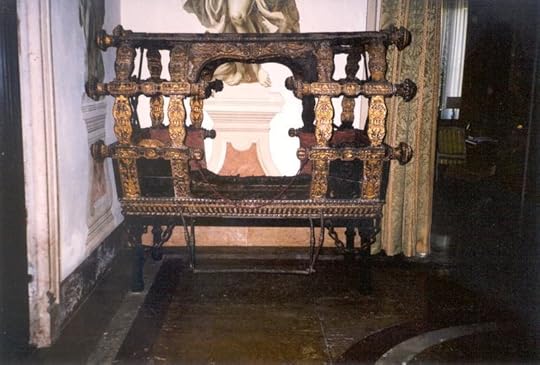
We ended up in a small study (small being a comparative word choice. It was smaller than some of the rooms we'd been in, but larger than our Chicago apartment). This one held the wedding coaches the bride and the groom rode in when the Alighieris married the Seregos. Like the entry foyer, this room had a crest in the stone floor and also a large fireplace and floor to ceiling French doors. We sat on an upholstered settee and the Count sat across a large coffee table from us in a leather club chair.
He and David discussed some of the history of the Alighieri family while I tried not to gape at the room. Apparently, the Alighieri sons had the tendency, in the generations following Pietro, to join the priesthood, and by the late 15th century there were no marriageable males left. At that point in the family's history, there was only one daughter, the sons both having taken holy orders. The daughter was courted by a Count Serego and, when he asked her brothers to marry her, they agreed on one condition – that they not allow the name of Dante Alighieri to die out. They would give the Count their sister if, in return, he took their name and passed it along to their children. It was at this time that the family became Serego-Alighieri.
At this point in the conversation, the Count switched gears and asked, “Would you like coffee?” He then stood, walked over to the door, and called “Marco!” out into the hall. A pause. “Marco!” He then spoke quietly to someone in the hallway and then returned to his seat.
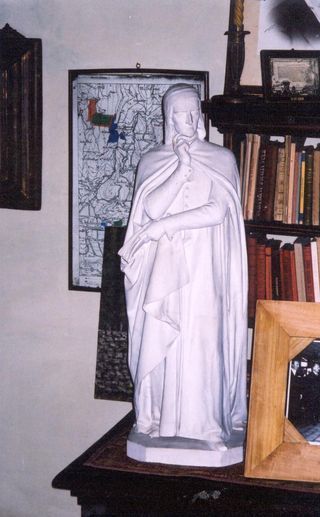 David asked a question about the original size of the land purchase and they continued their discussion. After a few minutes, a man tall man in a suit appeared in the doorway with a tray and silver coffee service. The Count stopped his narrative while the man placed the tray on the coffee table. "Grazie, Marco," he murmured as the man left the room. The Count then picked up his description of the original planting of the vineyards where he had left off.
David asked a question about the original size of the land purchase and they continued their discussion. After a few minutes, a man tall man in a suit appeared in the doorway with a tray and silver coffee service. The Count stopped his narrative while the man placed the tray on the coffee table. "Grazie, Marco," he murmured as the man left the room. The Count then picked up his description of the original planting of the vineyards where he had left off.
David and the Count chatted on for a while as I continued to look around the room and admire the small pieces around me. After a couple of minutes, I wondered about the coffee. It was just sitting there on the table between us. The Count's manservant (his manservant!... teehee) didn't appear to be coming back.
And then it occurred to me – I am woman.
Hear me roar.
Oh – and the Count seemed to be waiting for me to pour.
Seriously.
I was sitting in a 14th century villa in the Italian countryside with my husband and a Count and they were expecting me to pour their coffee.
After a few calming breaths and a mental gathering of the all the societal morays I’d culled from Jane Austin's novels, I reached out and took the handle of the coffee pot and asked, “Shall I pour?”
The Count waived assent with one cigaretted hand and continued to talk to David about the outbuildings and when they were added to the original plan.
I sat on the settee with the coffeepot in one hand, picking up the cups and saucers in the other and trying to keep my hands still enough that the china didn't rattle as I asked at appropriate breaks in the conversation, “How do you like your coffee?”
The Count likes his with a little cream.
Somehow I managed to serve, feeling like I was having tea with the Queen. And feeling incredibly American and incredibly 21st century. And feeling a little bit angry with my feminist self who wouldn't shut up and stop whispering in my ear, Why can't he pour his own damn coffee?
The books that came out of all this are THE MASTER OF VERONA, VOICE OF THE FALCONER, and FORTUNE’S FOOL. I’m pretty proud of them, and of David.
June 13, 2012
It's a Many Splendid Thing
HER MAJESTY’S WILL is many things.
It’s a spy novel.
It’s a Tudor novel.
It’s a Shakespeare novel.
It’s my (unintentional) answer to the film Anonymous.
It’s a little Tom Jones (both the novel and the film).
It’s an ode to the late Robert Asprin’s Myth Adventures series.
And it’s an homage to Bob Hope and Bing Crosby. I’ve always loved the Road Movies, the original buddy comedies. So when I first conceived this rather ridiculous story, it leapt from my brain like Athena from the brow of Zeus, fully formed.
Will Shakespeare. Kit Marlowe. The Babington Plot. Absurd!
And yet – Marlowe was a spy for Walsingham. Shakespeare did have these ‘lost years’ between Stratford and his first recorded London appearance. And the cast of London characters is far too good to resist.
I love spy novels, with secrets and reveals. But too often the right piece of information comes along at just the right moment. What if it didn’t? What if we think we have all the pieces, only to discover we’re just really bad at being a spy.
I love Tudor novels, with their copious details and period flavor. But too many of them seem to view the world from the court down, not the gutter up. Actors were the ones who bridged that divide, residing in the gutter but playing for monarchs. Warfare, church, and theatre – the three modes of social mobility. What if we never even get more than a glimpse of Elizabeth and her court?
And I love Shakespeare, love him too much to leave him in peace. Because while I love him, I do not revere him. His characters are great, but his plots are pretty dumb. He stole everything he ever wrote, and just happened to improve it along the way, thereby helping to create the modern idea of humanity.
So for HER MAJESTY’S WILL, I employed a ridiculous stolen plots with copious details amid lots of secrets and reveals. Most of all, it’s a buddy comedy. Will and Kit on the Road to London.
I hope it’s as fun to read as it was to write. Because I was smiling the whole time.
There are a few lovely reviews (and one especially delightful in that it calls me crude! I've been trying to overcome my innate prudery, and it appears I succeeded! Huzzah!) The loveliest review is here. And you can buy the book here. Enjoy!
May 30, 2012
The Numbers Game
So - I’ve got five books out now.
4 of them are brand new.
4 of them have to do with Shakespeare.
4 are set during the Renaissance.
3 of them are set in Italy.
3 of them have good titles.
2 of them are sequels.
1 is a comedy.
1 is about heartbreak, of almost achieving your dreams, only to have them snatched away.
1 is about a war that changed our lives, a war so few of us are even know about.
1 has Kit Marlowe in a dress.
3 have a greyhound.
2 have a falcon named Susanna.
1 has a bear.
All of them are about betrayal.
So – which do you want to talk about?
May 25, 2012
Future Will & Kit Titles
I'm already getting requests for more Will & Kit, which is just what I was secretly hoping for. I wrote it as a stand-alone, a fun romp through Shakespeare's lost years, taking a silly premise and just having fun. As I've said before, I was grinning throughout the whole writing process.
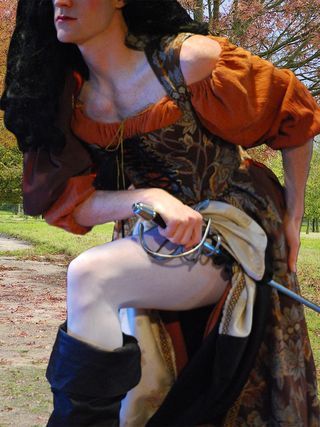 But IF I were to do another, I know what the next plot is likely to be, and I certainly want to eventually tackle Kit's "death" in Deptford. So that's at least two more possible books, with lots of room to play.
But IF I were to do another, I know what the next plot is likely to be, and I certainly want to eventually tackle Kit's "death" in Deptford. So that's at least two more possible books, with lots of room to play.
Now, I have a lot of other writing I intend to do this year - The Prince's Doom, the next three Colossus books, my noir Elizabethan "Have Sword Will Travel" novel (which I mention here for the first time), editing the first novel I ever wrote to see if there's anything valuable in there, and finally the big book about Hell that I have in mind. Yup, that's what I want to be done with by this time next year. We'll see.
But since the response to HMW has been so positive, I may take the occasinal break to write a chapter or two. After all, this one was originally written to be a serial novel on the Shanghai Low site! So writing chapters in fits and starts worked once. Why not again?
What I'm interested in are titles. I lucked into HER MAJESTY'S WILL one day while I was in Washington DC. Until then it was just called WILL & KIT. But now I like the double use of the word/name "Will." Much the same way that Bob Asprin used Myth in all his titles to hilarious effect, I'd like the word Will to be woven into the titles. So far this morning I'm toying with THIS WILL WON'T DO and WILLFUL FOLLY.
So I'm looking for suggestions! If you have one, throw it into the comments, or else onto the Facebook Page, and I'll make a list. Have fun! 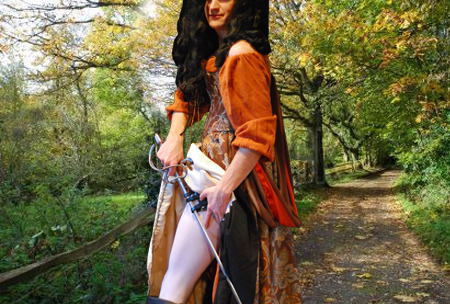
Crowdsourcing Typos
One of the things that drove me mad over the printed editions of THE MASTER OF VERONA was that there were typos. I take typos as a personal affront, a judgment on my character, a deep failing. Reading, they make me crazy. So the fact that not only myself, but an editor, copy-editor, and typesetter had missed glaring typos broke my heart. And I was overjoyed to have the chance with Kindle to fix them.
But then I decided to edit the novel again, making changes, cuts, and additions. So there were a whole new raft of typos. But now there was only me to fix them. And I missed a bunch.
The great part about the Kindle edition is that I can fix them. They can input said typos and republish in a nonce. So I'd like to thank my friend Melanie Schuessler for taking the time to mark every one she saw and bring them to my attention, so I could pass them on to Kindle. A few were deliberate, but there were more than enough that weren't - a wrong tense here, a missing word there.
So if you're reading the novels and see something amiss, please let me know! Because unlike the printed edition where I could only gnash my teeth, I can actually do something about it. So hit me through the website, or else on my Facebook author page. Thanks!!
May 11, 2012
Guest Post - Historical Boys
There's a really lovely piece written by my wife about our first trip together to Italy while researching THE MASTER OF VERONA. It's put up by my good friend, the amazingly talented author C.W. Gortner at his blog Historical Boys. If you're not a regular visitor there, start now. And if you're not a reader of Christopher's, put down what you're reading now (even if it's mine) and pick up his books. Now.
But read Jan's piece first.
May 9, 2012
A Silly Yet Helpful Thing
Just like Facebook, Amazon has "Likes." I don't think I knew that, but they're there, just below the title of the novel. So here's a silly request - can you "Like" my books? I don't know what it does, or how it helps in the world. But it doesn't cost anything, and like Peter Gabriel says, "I like to be liked."
So if you're stopping by Amazon, click HERE, and check out each book, and click like. Because you like me, don't you?
May 6, 2012
Star-Cross'd Maps
The only trouble with the regular Kindle is that the maps can be rather small. So I thought I'd share them here. These were drawn by my mother, Jill Blixt, and she did an incredible job. They're based on the maps in A.M. Allen's THE HISTORY OFVERONA. First we have the map of the region:
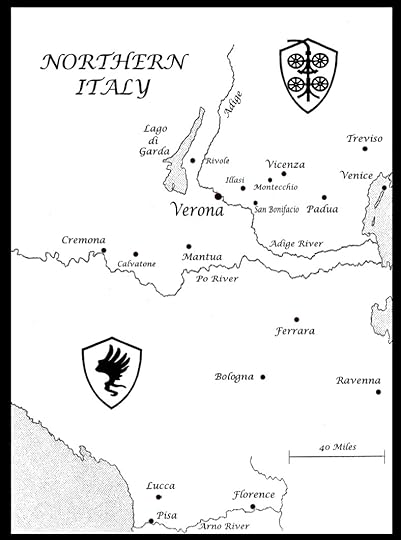
Next is the map of the city itself:
Next comes the only map that changes between books, the map of the area around Cangrande's palace. On these maps and in the novels, it's labeled Piazza della Signoria. That's a deliberate error on my part - it should be the Piazza dei Signori. But having made the error in the first novel, I've decided to stick with it. It's not incorrect, but it's not right either.
So this is the version from THE MASTER OF VERONA, in 1314:
Note an anachronism. Via Cappello is a modern name (since 1871), taken from the inn with stable ‘at the sign of the hat’, the building that is now known as ‘Juliet’s House’. The oldest known name is Via di San Bastiàn (Street of St. Sebastian), from the name of a church built in 932 A.D. at one end of the street (nowadays it is one of the buildings of the Civic Library). But again, it helps with the story and I used it in MoV, so it remains.
Next there are some subtle changes over the next 11 years, bringing us to the map for VOICE OF THE FALCONER in 1325:
And there's no real change from that to the map for FORTUNE'S FOOL:
May 4, 2012
Kindle Apps
It's a lovely sign that people are interested in the novels that I'm getting questions every day from readers who want to buy the books, but don't own an Amazon Kindle. Let me share a secret - neither do I.
My wife loves her Kindle - it's both the best and worst gift I've ever given her, as I used to buy her books and now I have to think of other things. But she loves it.
Me, I use my phone to read Kindle books, or an iPad, or my computer.
The smartest thing Amazon has done with their Kindle service was create a free App that lets you read their books without buying an actual Kindle reader. You can go direct to the Amazon site and download the app for your Mac, PC, Android tablet, iPhone, iPad, Blackberry, or Windows phone HERE.
Avalanche 8 - ORIGIN OF THE FEUD
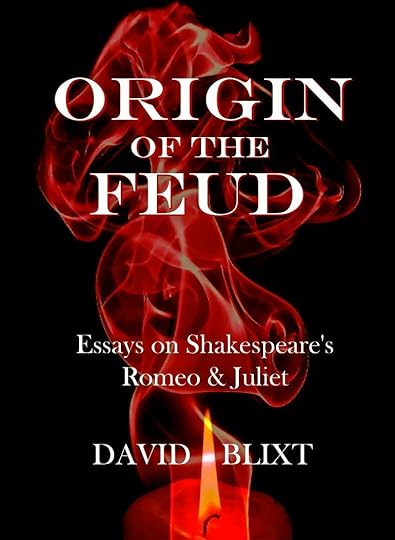
Longtime readers of this blog will certainly recognize the centerpiece of this collection - my take on the origin of the Capulet-Montague feud which led to the writing of THE MASTER OF VERONA. But I've gone much further in this collection of essays, exploring the show itself - from a theatrical standpoint as well as a literary one. In fact, most of the pieces are about the play in performance - how to merge scenes, the question of the balcony in the Balcony Scene, and much much more. Only $1.99 on Kindle!
Buy it HERE.

